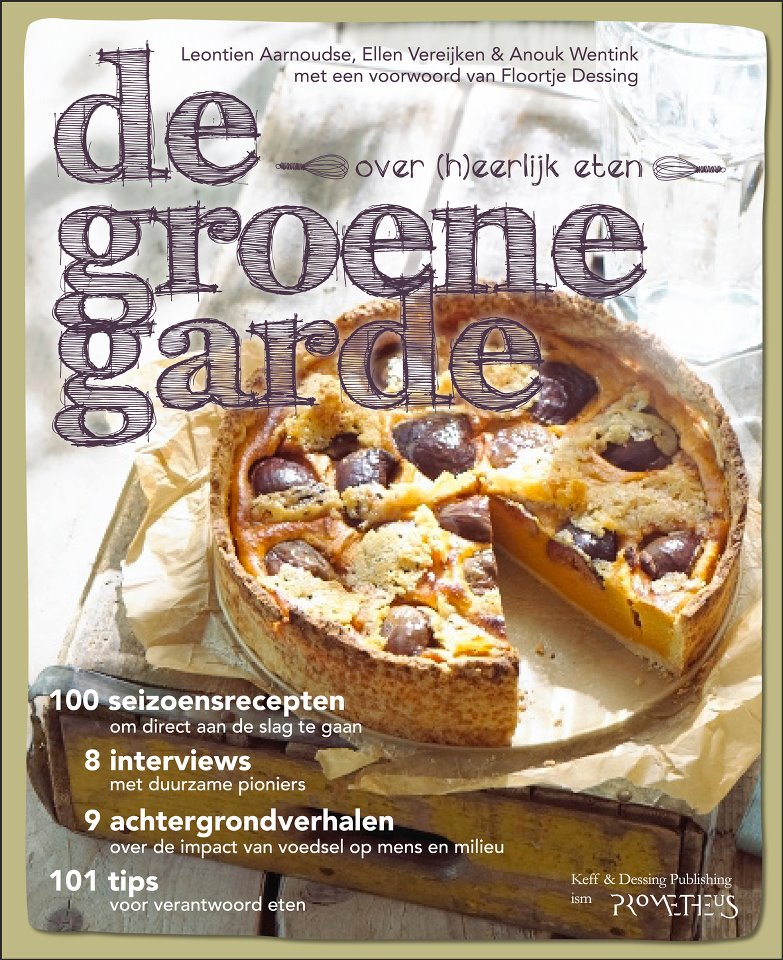24\09\2012
Written by Jurriaan

De Groene Garde on honest food
Good food has not only to do with taste, but also with its origin: where the food comes from, how it was produced and what impact it has on people and their environment. De Groene Garde (meaning ‘green guard’ as well as ‘green whisk’) is an initiative by three Dutch ladies all working with sustainability on different levels. In their cookbook Over (h)eerlijk eten (on lovely/honest food) they stretch the importance of eating ‘greener’, more honest food without being dogmatic.
At the same time they realize nowadays all the different quality labels (such as organic labels), various food additions with complicated chemical names and the vague distinction between ‘good’ and ‘bad’ fish are not making things easier. While giving tips on eating more consciously De Groene Garde also offer a selection of wonderful recipes, different background stories on the impact of food on people and their environment as well as interviews with sustainable pioneers. We had a little chat with Leontien Aarnoudse, one of the initiators.
BLEND\: A lot of people hear the word ‘organic’ and immediately think ‘expensive’. What tips would you give people who want to eat more organic food without spending more money?
Aarnoudse: The idea behind our book is not to buy only organic food, but also to buy seasonal and local products, waste less food and eat less meat. Those are all examples that usually cost less money.
BLEND\: I notice that when I speak about organic food with my (non-organic food eating) friends, they are usually unaware of the exact meaning of the term. Most people know there is less hormones and medication involved, but to be clear can you please tell us the difference between regular and organic foods?
Aarnoudse: Organic food is food that is produced using methods that do not involve synthetic pesticides and chemical fertilizers. Processed organic food, like bread or cookies, usually contains only organic ingredients. Organic meat means that the animals have had a better life (more space, see daylight, more movement, using their muscels e.g.) and don’t receive antibiotics if they aren’t ill. Animals are also not allowed to eat genetically modified foods.
BLEND\: A big problem that is adressed by De Groene Garde is the enormous amount of food waste. You state 1/3 of the food produced is disgarded, by either the consumer or the producer, for example because it does not meet the high standards (for examply oddly sized vegetables) or because it is near the expiration date. What can you do as a consumer to cut down your food waste?
Aarnoudse: Basically, there are three things you can think of: 1 smart shopping, 2 smart cooking and 3 smart preserving. Regarding the first action: don’t let the supermarket seduice you to buy fresh products that you don’t really need, make a shopping list and don’t put soft cheeses or fruit on the bottom of your shopping bag. Smart cooking means think before you start your cooking adventure: how many people do you need to cook for? Are they big eaters or small eaters? Smart preserving refers to keeping your food and your leftovers and preserve them well: apples and pears can go in a bowl, potatoes and onions in a dry and dark place and strawberries, cheese and milk in the fridge at 4 degrees C.
So, to sum it up a basic list of tips you can follow to eat in a more sustainable way according to De Groene Garde:
When buying food take notion of products that are:
– Fresh: real fresh products, instead of pre-packaged or ready to eat, are more tasteful as well as healthy: they contain more vitamins and minerals, but less fats and salts. When you are unsure about the contents of a meal or difficult substance names on the package, just know that when you cook something from scratch you know exactly what is in your meal!
– Seasonal: these take less energy and CO2 emission when produced. They are usually also cheaper and more tasteful.
– Organic: no use of unnatural pesticides, genetic manipulation and antibiotics for animals who are not ill (which can lead to antibiotic resistance in humans). Animals have a more free life, see daylight, live longer, use their muscles and have more freedom to move.
– Local or fair-trade: vegetables and fruits grown locally are fresher and cause less CO2 emission. Also buying them stimulates local economy! Mass production usually goes hand in hand with large-scale agriculture and monoculture, which threaten the biodiversity. A second best would be: fair-trade products grown by farmers in third world countries who get a fair price and who are treated well.
Remain conscious of your consummation of:
– Meat: producing animal products causes a lot of environmental problems (18% of the total CO2 emission is caused by the meat industry) as well as animal suffering. Also unique tropical rainforests are being cut down in order to produce soy, used as food for the cattle. Meanwhile the average person has a higher protein intake than necessary. Try swapping animal products for vegetables, fruit, nuts and legumes. If you find it hard to give up your meat try organic meat or good vegetarian substitutes.
– Fish: it is very healthy but various kinds of fish are threatened with extinction or caught using irresponsible methods. Check for fish caught responsibly.
– Food in general: about 1/3 of the food is wasted by the consumer. By buying, preserving and cooking more efficiently try to cut down the waste. Also beware of the ‘best before’ date; this is merely an indication and not an actual expiration date.
Photography: Hans Hogervorst
Foodstyling: Sander de Ponti
Styling: Janwillem van Riel




